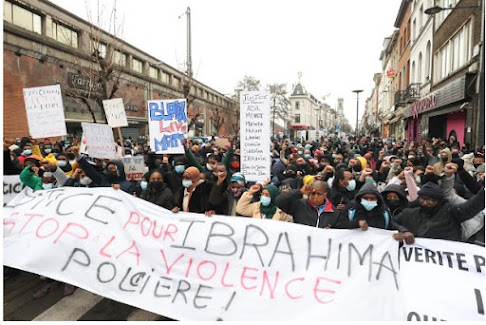Due decessi per «overworking» all’interno di una delle aziende leader dell’e-commerce cinese hanno scatenato le proteste sui social contro «i capitalisti».
Workers in Misery: An Investigation into Two Toy Factories
The Dark Side of the Glittering World: A Report on Exploitation in Factories in China
report in coda in inglese in via di traduzione - foto operai che dormono sulla linea di produzione
il testo di convocazione del forum della Rete
La
Cina è tornata. Un po’ a sorpresa, per chi l’aveva considerata
un’appendice del turbocapitalismo. E invece proprio la pandemia ha messo
in evidenza l’esistenza di un’organizzazione sociale e statuale che ha nei fatti, non solo nelle dichiarazioni, priorità diverse, se non opposte, a quelle vigenti nel neoliberismo occidentale.
Sabato
16 gennaio dalle ore 15 la Rete dei Comunisti propone un Forum
nazionale online sul tema del ruolo della Cina nel mondo multipolare.
Alcuni
risultati della Cina sono sotto gli occhi di tutti. Salvando la propria
popolazione è oggi l’unico Paese al mondo che ha evitato la “seconda
ondata” del virus. Ed è anche l’unico in formidabile crescita economica.
Il
merito va ovviamente alla capacità di fare pianificazione,
programmazione, subordinando l’interesse privato a quello collettivo.
Senza cancellare il primo, certo, ma senza neanche farsene dominare.
Torna
come grande potenza industriale, avanguardia tecnologica, sistema
sociale efficiente in grado di liberare dalla povertà centinaia di
milioni di cittadini e di garantire consumi crescenti invece che
“austerità”.
Torna
come grande potenza potenzialmente egemone guidata da un Partito
Comunista, certo “con caratteristiche cinesi”, mentre l’imperialismo
occidentale è in grandissima crisi.
Le
domande non mancano: la Cina perseguirà d’ora in poi una “politica di
potenza”, diventando un imperialismo in competizione con quello
americano ed europeo?
Oppure svilupperà gli elementi di socialismo che sono presenti al suo interno?
Non
si tratta però di sperare o auspicare. Si tratta di conoscere e capire,
sapendo che una realtà con quelle immense dimensioni non può essere
ridotta a formulette usa-e-getta, buone per la propaganda spicciola.
Su
questo la Rete Dei Comunisti propone una riflessione collettiva, un
confronto ad ampio spettro. A cominciare dal Forum “La Cina nel mondo
multipolare” che si terrà in streaming sabato 16 gennaio alle ore 15 Su
Facebook: https://www.facebook.com/retedeicomunisti/photos/gm.702996390646304/5316072945073192
I lavori del forum saranno introdotti da Giacomo Marchetti e conclusi da Lorenzo Picccini della Rete dei Comunisti.
Tra i relatori figurano Giorgio Casacchia (ex docente presso l’università L’Orientale di Napoli)su: “Imperialismo linguistico e resilienza cinese”; Roberto Sassi (saggista) su: “L’Assalto al Cielo: La Cina dal ’49 alla Costituzione del ’75”; Francesco Piccioni (Redazione Contropiano) su: “La Cina dalla morte di Mao a Xi: continuità e rotture”; Paolo Rizzi (dottorando in sociologia economica)su : “Il Partito Comunista Cinese e la dialettica sociale nella Repubblica Popolare oggi”; Chiara Pollio (ricercatrice in economia applicata)su : “L’attuale sviluppo del settore industriale in Cina: verso quale futuro?”; Luciano Vasapollo
(professore di economia politica all’università Sapienza di Roma)su :
“Le relazioni commerciali internazionali cinesi ed il ruolo del
Renmimbi”; Francesco Macheda (docente di economia politica)su : “Il settore pubblico in Cina”; Giorgio Cremaschi (portavoce nazionale di Potere al Popolo)su: “La Cina Popolare nella cultura dei comunisti in Italia”.
Il documento per la discussione: La Cina nel mondo multipolare
report Workers in Misery: An Investigation into Two Toy Factories
Thousands of toys
are sold each day, bringing joy, happiness and smiles to the faces of
children. At the same time, workers in toy factories in Guangdong
Province, China struggle to cope with the high-pressure environment and
the long working day. One of the workers is so exhausted because of the
high production targets every day, that her body ached all over, and she
could not help but cry in the dormitories. Another female worker was
sexually harassed, and the male worker who sexually harassed her even
threatened to hit her. Although this happened inside a toy factory,
nobody thought there was anything wrong. More importantly, nobody felt
the need to stop these abuses from happening.
Since 2001,
China Labor Watch has been conducting research on China’s toy factories.
We believe that having compassion is a virtue that every child should
be taught. When parents choose toys for their children, they have the
right to know about the unfair treatment and exploitation that workers
experience, especially female migrant workers.
This year,
China Labor Watch investigated two toy factories in China’s Dongguan
city. One of the factories is a Mattel-owned factory, and another is a
supplier factory of Mattel, Chicco, Fisher-price and Tomy.
The
COVID-19 pandemic has affected the toy supply chain. However, global
toy sales have increased, as children have stayed home from school
across the world and parents have purchased toys to keep their children
entertained . For Mattel alone, their Quarter 3 2020 financial results
revealed that the company’s net sales increased by 10% compared to last
year, reaching $1.6 billion US dollars. For the same quarter, their net
income was $316 million US dollars .
The factors that
contribute to the growth of toy companies is not only the purchasing
power of consumers, but also the workers who work overtime and earn
meagre wages. In the assembly workshop of Changan Mattel, the daily
production target for each production line is around 1300 to 1400
products. Workers only have 30 minutes for a meal, and work 10 hours a
day from Monday to Saturday. That is, workers have to produce over 100
products every hour, so they can complete the production target. Workers
generally put in around 80 overtime hours a month. They sometimes had
delays of 30 minutes in getting off work, as they were required to stay
back and complete the production target and workers were not paid for
this. Workers only earn an hourly wage of less than $2USD. Workers at
Dongguan Dongyao also put in 10 or 11 hours a day, and work overtime on
Saturday during peak season. September had the most overtime hours, and
workers put in 92 to 112 overtime hours that month. Both factories are
in clear violation of overtime laws in China which mandate that overtime
hours must not exceed 36 hours a month.
For
20 years, there have been some improvements in China’s toy factories .
But these improvements lag behind, when compared to the 20 years of
development in various industries in China. Workers’ socioeconomic
status has remained the same over the years. They receive the least
amount of respect and earn extremely low wages when compared with the
rest of society.
Several serious rights violations at both factories are highlighted below:
Workplace Psychological Violence
According
to related documents from the ILO, psychological violence can be
defined as the “intentional use of power, including threat of physical
force, Physical violence, against another person or group that can
result in harm to physical, mental, spiritual, moral or social
development. It includes verbal abuse, bullying/mobbing, harassment, and
threats”.
We have found psychological violence in the workplace
of both factories. For example, the team leader and assistant team
leader on the workshop assembly line at Changan Mattel would scold
workers who are working slowly, and even called a worker a “stupid
cunt”. After a worker was injured, the workshop team leader would scold
the injured worker for not being careful enough, warning them not to
report this to the factory. The team leader of Dongguan Dongyao ignored
workers’ requests for masks, and was passive aggressive, ignoring
workers who asked not to work overtime. This gave workers a lot of
psychological pressure, and makes it even harder to ask for protective
equipment or not to work overtime.
Sexual Harassment
Sexual
harassment has gained increased awareness in recent years, yet little
research has been done in factories in China. Last year, we found cases
of sexual harassment at Foshan Mattel. This year, at the Changan Mattel
factory, there were issues with sexual harassment, which shows that
Mattel has largely failed to put in place measures to protect victims
and also to address the issue. For example, one of the male workers
would regularly sexually harass female workers in the workshop. The
worker would call one of the female workers “dear”, and explains he does
this so that she is excited. He also would touch the hands and hair of
another female worker. The assistant team leader sees this behaviour and
not only fails to stop it, but even joined in with sexual comments,
such as asking the male worker if he masturbated the night before. The
Wechat group originally formed to coordinate workers had sexual comments
almost every day and a worker even posted the contact information of
sex workers in the group.
Occupational health and safety
The
two factories provided paid pre-job safety training to meet the
requirements in the Labor Law, yet both factories fell short of the 24
hours of training as legally mandated.
Changan Mattel requires
every worker to receive at least 24 hours of safety training in the
first month of employment. However, the investigator found that workers
usually have training on the first day of employment for four hours and
there is no other training afterwards. At the Dongyao factory, workers
merely watch a video for two hours and most of the workers fall asleep
watching it. It is precisely because of the lack of training, that it is
difficult for workers to avoid injuries when operating machines.
At
Changan Mattel, no one showed the investigator how to use the
laminator, and she burnt her hands multiple times. Workers in the spray
painting workshop were exposed to chemicals every day, and some workers
had paint in their nostrils after work. They were not provided with any
special protective mask other than a surgical mask which cannot properly
filter harmful aerosol.
At Dongguan Dongyao, a worker
using thinner was not provided with gloves, and her hands had ulcers.
Another worker who was also using thinner had skin redness, swelling and
itching. Though she was scolded by the director after telling him and
she could only go to a small clinic nearby to get an injection to
relieve the symptoms. At the soldering station that produces black
smoke, a mask with activated carbon is required, yet some workers wore
masks and others did not. The masks they wore were merely ordinary blue
masks. The factory did not ensure workers were wearing masks that they
were provided with as the investigator saw some workers using hexane but
did not wear masks.
Worker Representatives
Individually,
each worker can feel powerless in the face of factory management.
Forming a union or electing worker representatives has become most
likely the only legal way for workers to communicate with the factory
about grievances. Although there was a union or worker representatives
at the two factories we investigated, these were only there as formality
and were ineffective in representing the rights of workers, who mostly
did not even know they existed.
In particular, the Changan
Mattel factory had a range of departments such as “Home of Mattel”,
“Worker Hotline”, Communist League Branch, All-China Women’s Federation.
Yet these departments did little to assist workers. When a female
worker had a miscalculation of her wages, none of the departments in the
factory were willing to resolve the issue. It was only when she
threatened to call the local Human Resources an Social Security Bureau
to report the illegal deduction of wages by the factory, that the
factory resolved the issue.
Dongyao factory does not have a
union, and requires workers during the job interview to sign a form that
says they are unwilling to join the union. According to Article 7 of
China’s Labor Law, workers have the right to participate or organize a
union. Dongyao factory has a list of worker representatives, and each
department elects representatives. But according to a worker
representative, elections only occur when it is convenient for the
factory to hold these meetings. Worker representatives are also only
responsible for disseminating information from the factory (for example,
changes in work schedules). They do not actually communicate the needs
and issues that workers face, to the factory.
COVID-19 Prevention Measures
Since
the COVID-19 outbreak, workplaces across the world have had to adapt
and put in place measures to prevent the spread of the virus. At
factories, most workers usually rely heavily on the cafeteria because of
the short lunch break, making it difficult to go to restaurants outside
the factory. The cafeteria meals are also cheap, and because of the
pandemic, eating out can become risky. At Changan Mattel, applicants
were required to test negative for the COVID-19 nucleic acid test before
they were interviewed and the factory also put up glass or cardboard
dividers between each worker eating.
Dongyao Factory’s food
is free, but the dining environment is worrying and there are issues
with food hygiene. For example, workers found hair, rotten vegetables in
their food and there was even a cockroach found in a worker’s lunch one
day. There are not enough tables and chairs in the restaurant for
workers to sit and eat. One table is shared by six workers, and their
arms are touching each other. Many workers still need to squat on the
ground to eat. Workers use their own tableware when getting food from
the public rice containers, increasing the risk of spreading the
coronavirus. We have yet to see Dongyao take any effective measures to
prevent the spread of COVID-19.
Social Insurance
Chinese
Labor laws requires employers to purchase social insurance for workers.
Social insurance covers the five categories of pension, unemployment,
maternity, medical, work injury and also a housing provident fund.
At
Changan Mattel, workers only received social insurance after they had
passed the probation period. The social insurance covered pension,
unemployment insurance, medical insurance and the housing provident
fund.
At Dongguan Dongyao short term workers signed a
“Declaration Disagreeing to the Purchase of Social Insurance” to
voluntarily give up the purchase of social insurance. However in
reality, workers were not asked whether or not they wanted to purchase
social insurance. At the same time, despite signing this declaration,
the factory would still purchase social insurance for some workers. Long
term workers receive social insurance after the probation period, and
we are unsure which categories of social insurance the factory purchases
for workers. Workers who were 50 years of age signed a service contract
which mentioned that workers would be purchasing social insurance on
their own, and the factory would only be purchasing commercial insurance
for them.
Pregnancy and Maternity Protection
We are unsure whether Changan Mattel and Dongguan Dongyao purchased maternity insurance for workers.
The
contracts at both factories stipulate that workers enjoy paid maternity
leave, but it remains unclear how many days workers receive. At Changan
Mattel, many workers did not know they had this leave as no one had
explained the contract to them. A flowchart at the factory shows that
workers can apply for maternity leave after three months of pregnancy.
But several female workers who had given birth previously said it is
difficult for female workers to continue working at the factory until
they give birth. As there is a heavy workload with some workers exposed
to chemicals, it can be very exhausting and harmful for pregnant women
to continue working. So female workers generally aren’t able to enjoy
maternity leave benefits and it is mainly management staff who take
maternity leave. A female worker who was pregnant had to apply not to
work night shifts, instead of the workshop director taking the
initiative to switch her to working during the day. She eventually
resigned because it was too exhausting to work at the factory.
The investigator did not find any other special facilities or benefits for pregnant women at both factories.
Conclusion
For
years, we have urged toy companies to take measures to address
persistent rights abuses in their supply chain. Yet, time and time
again, we have found the same workers’ rights violations such as low
wages, excessive overtime, insufficient protective equipment and lack of
effective complaints mechanisms. Both Dongguan Dongyao and Changan
Mattel are certified by the ICTI Ethical Toy Program. We specifically
urged the Ethical Toy Program and Mattel after last year’s investigation
into Foshan Mattel factory to take effective measures against sexual
harassment and discrimination. However, our report shows they have
failed to protect workers. For too long, workers have been treated as
merely a “cog in the machine”. Toy sales have surged amid the Covid-19
pandemic, but companies have not channelled these profits into improving
the lives of workers on their production line. Companies are well aware
of the working conditions at their factory and have pressured factories
to meet high production targets whilst driving production costs down,
which has come at a cost to workers’ wellbeing. Companies ought to do
more to improve the livelihoods of workers.
Summary of Rights Violations

































